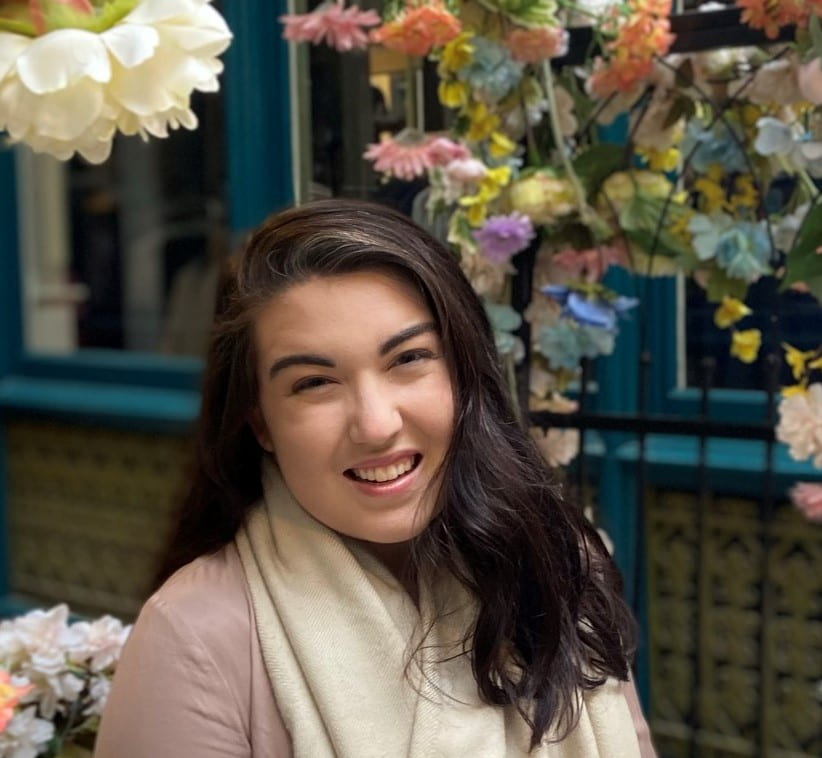“In another world, I’d be a yoga instructor and own a bed and breakfast,” Rachel Sumption, Civic Scholar Class of 2016, confessed. But in this world, Rachel does quite the opposite—she is an associate at Clifford Chance, an international law firm, taking business calls at odd hours from her apartment in London, England while juggling pro bono immigration work.

During her time as an undergraduate student at Washington University, Rachel found herself “really interested in studying not only the postcolonial history of the Middle East, but also learning more about how people’s experiences of their faith interact with their place in history, with their place in culture.” Likewise, she declared a major in Islamic and Near Eastern Studies (now Jewish, Islamic, and Middle Eastern Studies) along with a minor in Arabic.
While studying abroad during the fall of her sophomore year at the University of London, she was inspired to apply to Civic Scholars: “as an incoming junior, I was a newcomer to the field of interfaith work. I wanted to be in a learning role so I could come back to campus and execute some organizing tactics and apply the things I had learned.”
And that’s exactly what Rachel did—she learned more about interfaith work while interning at the Tanenbaum Center for Interreligious Understanding in New York City and attended a conference in Saskatchewan, Canada, focusing on First Nations faith traditions and spirituality as a young adult scholar for the North American Interfaith Network.
“The experience of being in a learning position translated into concrete action—it inspired me to lay a foundation for a lasting interfaith community at WashU.” Applying what she absorbed as an open-minded observer, Rachel resurrected WashU’s annual Interfaith Week and re-established WashU’s Interfaith Alliance.
“I spent a lot of time listening to people’s stories of their faith and their lived experience here in the states and many of those stories, as you might imagine, are immigration stories. They’re stories of how people have made a home and have found their cultural and spiritual identity.”
“Immigration, in and of itself, is an interfaith field,” Rachel remarked. “The expression of interfaith was one of the primary drivers that led me to immigration law. Although I am not actively involved in interfaith groups at the moment, my experience as a [Civic] Scholar informed a lot of my later professional choices.”
Passionate, prepared, and eager to further engage in interfaith dialogue after graduating WashU, Rachel accepted an English Teaching Assistant Fulbright Grant in Rabat, Morocco, allowing her to practice her second language while teaching students at a public university.
“I don’t think I’m exaggerating when I say that Civic Scholars influenced how I exist in the world. Every day. A lot of the choices that I make and the way that I try to interact with my community is fundamentally shaped by my experience. I know that may sound trite, but it’s true.”
“My experience taught me to be cognizant of how I was having an impact on my community both outside and within the confines of my job. It instilled a very fundamental desire in me to be rooted in a community, in a local community, in a neighborhood. Even now in London–I’ve only lived here for a few months and I’m close with my neighbors. I will be a legal observer for neighborhood protests, I’ve lent sugar and brought baked goods to my neighbors, I’ve helped them out when they needed something… Being knit into a local fabric is a huge part of the way I live my life, I make a conscious effort everywhere I live to be of a community as well as in it.”
Now a Georgetown Law 2020 graduate with a Certificate in Refugees and Humanitarian Emergencies, Rachel regularly reminds herself to embrace the imperfections inherent to the fast-paced, demanding work of immigration law: “I think, especially when you’re involved in a social issue, any mistake you make can feel like an impediment to the cause,” she pauses to chuckle, then adds, “that’s not the case at all.”
“I know many social causes can lead to burnout after doing them hard and fast for a long period of time,” she added, “but I think one of the most life-giving things, as someone involved in social change, is to take what I’ve learned and to pass it on onto new cadres, to new generations, and to people who will carry on the work.”
Rachel enthusiastically offered her guidance to WashU students seeking career advice, just don’t call it networking: “If there’s something that piques your interest, let’s talk about it and see who I can connect you with,” but “the word networking makes me cringe. I like to think of it as bringing others with us on the journey.”